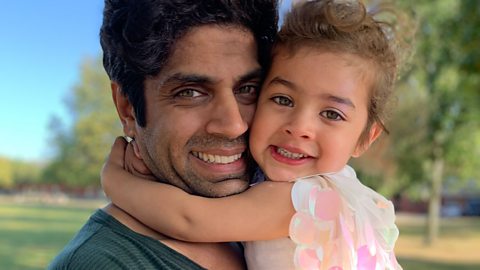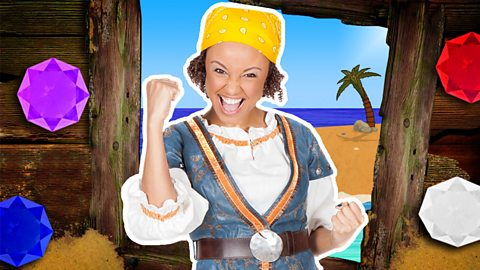Faraz explains how his daughter Iyla's language development is an amazing learning opportunity for him too.

As a middle child born in London suburb to South Asian parents in the 80s, fitting in was everything. Education was the most important thing to my parents and they’d stop at nothing to make sure we had a good life in the UK.
Despite picking up English quickly, my mum sometimes found pronouncing words tricky. ‘You know you shouldn’t speak to your kids in English, they’ll only pick up your Indian accent,’ someone once said to her at the school gates.
My parents were so worried and confused that we might fall behind at school, they were happy for us to be exposed to as much ‘proper’ English as possible: we loved Radio 1, ThunderCats and Roald Dahl books. Learning their languages – mum and dad both spoke Urdu – was not something that ever came up.
Wanting to fit in
The need to fit in wasn’t only felt by my parents: me and my brothers grew up wanting to be just like everyone else in our typically English village and school, and kind of distanced ourselves from our heritage. Most weekends were spent with our cousins in Kent running around causing havoc, playing with Transformers or making grunge rock music videos with a home camcorder – and always yelling at each other in English.
On our regular visits to relatives in India or Pakistan, we ignored the Hindi or Urdu words that were hand painted across everything from billboards to buses and chuckled at ‘Hinglish’ signs where locals made attempts to appeal to us tourists. Our family would excitedly chat in Urdu and we got used to not understanding what anyone was saying. Everyone made an effort to talk to us; their broken English was far better than my poor attempts at their language.
Realising I'd missed out
The first time it struck me that I might have missed out was when I started working in a team making TV shows for British Asians. My workmates would chat about the latest Bollywood film or Bhangra track and I suddenly found myself being that one thing I feared growing up – an outsider.
When I asked my mum, ‘How come you never taught us Urdu?’, the answer was more emotional than I expected. Mum was terrified that we would experience the same attitudes and frustrations as her. ‘I was worried that no one in the playground would understand you,’ she said, ‘and that you wouldn’t understand your teachers in school.’
I’ve since tried and failed many times to try and unlock some part of my brain that might have picked up Urdu or Hindi without me realising. I’ve bought books, tapes and apps but they’ve all gathered dust. And while I can follow a conversation, the chance of me speaking fluently in a second language seems unlikely.
Becoming a dad
My daughter Iyla was born in 2016 and like any new father, I am in constant awe about how fast she’s able to pick things up. Every day she seems to be learning something new.
It’s really important for me is that she stays connected to her Asian heritage and I’m keen that she benefits from having an international culture. I want the world to be her oyster.
She’s young and her brain is developing fast, so it's the perfect time for her to be introduced to another language.
And who better to teach her than my mum and dad?
I spoke to them both and asked if they would communicate with their granddaughter using as much of their mother tongue as possible. From the moment she started to speak, Iyla also has always said hello and goodbye to them with the traditional Muslim sayings ‘As-salamu alaykum’ (peace be upon you) and ‘Khuda hafiz’ (God protect you).
Mum started speaking to my daughter in both Urdu and English when she was a tiny baby and now she’s a toddler, they cook roti together, play jokes on my dad and use Urdu affections. It’s great for her learning, but also there are lots of ways it’s bonding us a family. It’s brought so much joy to my parents to see her flip between two languages.
It’s also given me the chance to learn Urdu. We watch cartoons together on YouTube, flipping between the English and Indian versions of things like Peppa Pig and Frozen singalongs.
Actively learning something new together feels like a very special kind of bonding between father and daughter.
But she’s definitely picking it up quicker than me – she’s already been bluntly correcting me like only a three-year-old can, so there’s a risk she’ll soon be giggling about me with mum without me understanding!
I’m proud of my heritage and always regret not having a full grasp of my mother tongue. Becoming a dad feels like a chance to try again.
Faraz’s top tips
Lead by example. If you want your little one to greet people in another language, then you should do the same.
See if popular programmes, songs and books have been translated into other languages. It’s easier to follow characters and stories that they recognise.
Try not to force things and keep it casual. Just like adults, kids are more comfortable responding in their first language – but that doesn’t mean they didn’t listen or understand what you said.
Share the best moments with your extended family and friends – getting everyone involved in language learning is the most fun part!






